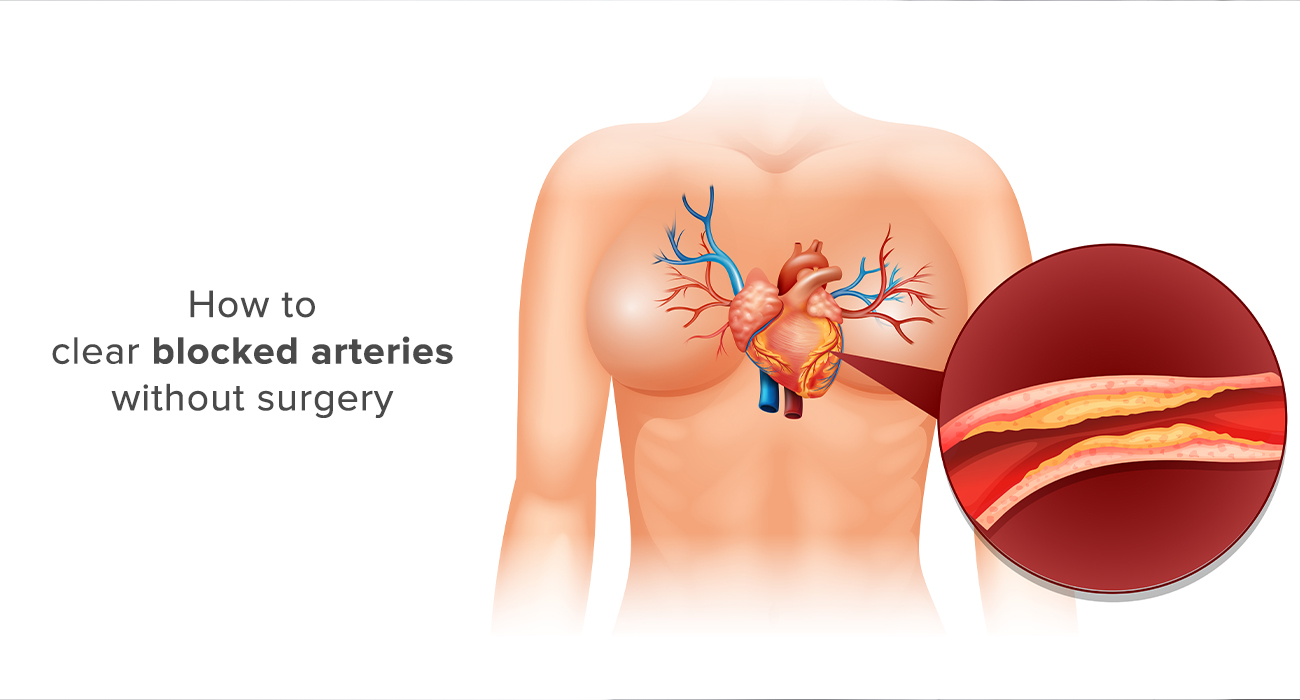03/26/2024
Blocked arteries are dangerous for cardiovascular health since they can result in serious consequences including strokes and heart attacks. While major cases are frequently treated with surgical operations such as angioplasty and bypass surgeries, many people look for less invasive ways to unclog blocked arteries. Natural methods that can enhance cardiovascular health and slow the advancement of arterial blockages include dietary modifications, frequent exercise, stress management strategies, quitting smoking, and the use of herbal supplements. People hope to improve blood flow, lessen inflammation, cut cholesterol, and eventually support heart health in general by using these natural approaches.
Dietary Changes
- Adopting a heart-healthy diet rich in fruits, vegetables, whole grains, and lean proteins can significantly impact arterial health.
- Incorporating foods high in soluble fibre, such as oats, beans, and flaxseeds, can help lower cholesterol levels and reduce plaque buildup.
- Limiting intake of saturated fats, trans fats, and cholesterol-rich foods can prevent further arterial blockage.
- Including sources of omega-3 fatty acids, such as fatty fish (salmon, mackerel, trout), nuts, and seeds, can reduce inflammation and improve heart health.
Regular Exercise
- Engaging in regular physical activity can improve circulation, lower blood pressure, and promote the development of collateral blood vessels, which can bypass blockages.
- Both aerobic exercises (such as walking, swimming, and cycling) and resistance training can be beneficial for cardiovascular health.
- Aim for at least 150 minutes of moderate-intensity exercise or 75 minutes of vigorous-intensity exercise per week, as recommended by health authorities.
Weight Management
- Maintaining a healthy weight is crucial for reducing the risk of arterial blockages.
- Excess weight can contribute to high blood pressure, high cholesterol, and insulin resistance, all of which are risk factors for cardiovascular disease.
- Adopting a balanced diet and regular exercise routine can help achieve and maintain a healthy weight.
Smoking Cessation
- Smoking is a major risk factor for cardiovascular disease and can accelerate the progression of arterial blockages.
- Quitting smoking can lead to significant improvements in arterial health and overall cardiovascular risk.
- Seek support from healthcare professionals, support groups, or smoking cessation programs to quit smoking successfully.
Stress Management
- Chronic stress can contribute to arterial stiffness, high blood pressure, and inflammation, all of which can worsen arterial blockages.
- Practice stress-reduction techniques such as deep breathing exercises, meditation, yoga, or progressive muscle relaxation.
- Engage in activities that promote relaxation and enjoyment, such as spending time in nature, pursuing hobbies, or socializing with loved ones.
Herbal Supplements and Nutritional Therapies
- Certain herbal supplements and nutrients have been studied for their potential to improve arterial health and reduce plaque buildup.
- Examples include garlic, turmeric, ginger, green tea, and coenzyme Q10 (CoQ10), which have antioxidant and anti-inflammatory properties.
- Consult with a healthcare provider before starting any herbal supplements or nutritional therapies, as they may interact with medications or have contraindications.
Medical Monitoring and Treatment
- Regular medical check-ups and screenings are essential for monitoring cardiovascular health and detecting any progression of arterial blockages.
- Depending on individual risk factors and the severity of blockages, medications such as statins, blood thinners, or antiplatelet drugs may be prescribed to manage cholesterol levels, prevent blood clots, and reduce the risk of cardiovascular events.
- In some cases, minimally invasive procedures such as angioplasty with stent placement or atherectomy may be recommended to address significant blockages.
Conclusion
In conclusion, although invasive operations are still necessary in extreme situations of clogged arteries, natural techniques present intriguing ways to improve cardiovascular health and possibly avoid the need for such surgeries. Individuals can greatly lower the risk factors linked to atherosclerosis by embracing a holistic strategy that includes a heart-healthy diet, frequent exercise, stress management strategies, quitting smoking, and the use of herbal supplements. Blood flow, inflammation, and cholesterol levels can all be improved by consistently adhering to these lifestyle modifications, though results may not show up right away. To achieve optimal cardiovascular health, people must collaborate closely with healthcare providers to evaluate progress, make necessary adjustments to treatment programs, and ensure complete care. A healthy lifestyle and a devotion to natural remedies can help people work toward having healthier arteries and a stronger heart.
Frequently Asked Questions (FAQs)
Q1. Can natural methods really clear blocked arteries effectively?
A: Yes, natural methods can play a significant role in improving cardiovascular health and reducing the progression of blocked arteries. Adopting a heart-healthy diet, engaging in regular exercise, managing stress, quitting smoking, controlling blood pressure, and incorporating natural supplements be effective in reducing risk factors associated with atherosclerosis. While severe cases may require surgical intervention, these natural methods can complement medical treatment and help prevent further complications.
Q2. How long does it take to see results from natural remedies for clearing blocked arteries?
A: The time it takes to see results from natural remedies for clearing blocked arteries can vary depending on individual factors such as overall health, severity of arterial blockage, adherence to lifestyle changes, and consistency with natural remedies. Some individuals may experience improvements in cardiovascular health within weeks or months of adopting a heart-healthy lifestyle, while others may require more time to see significant changes. It's essential to work closely with healthcare professionals to monitor progress, adjust treatment plans as needed, and maintain long-term adherence to lifestyle changes for optimal results.

